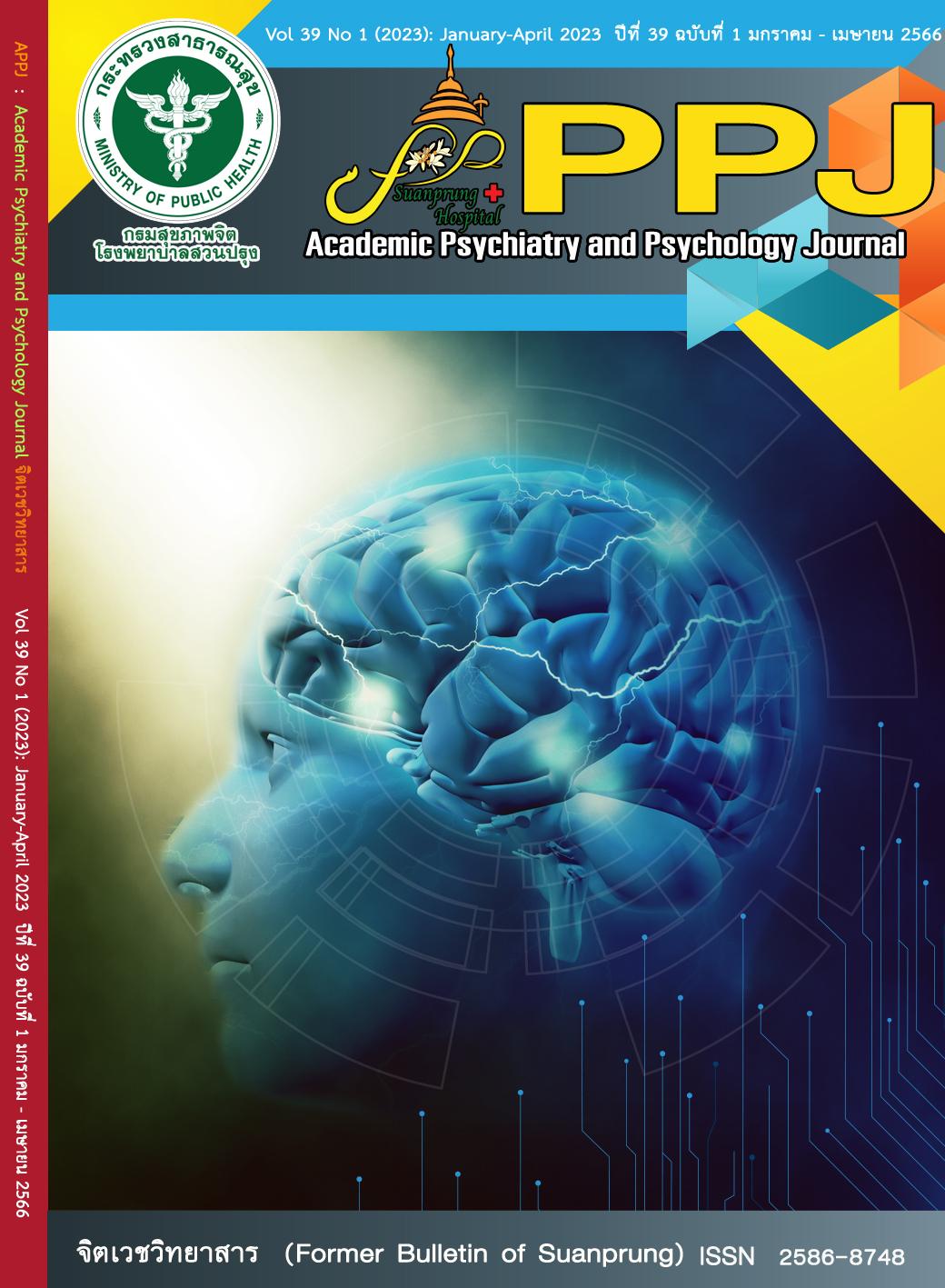Life Skills for Work: In-depth interviews with people who used to be juveniles in the Child and Youth Training Center District 7, Chiang Mai Province
Main Article Content
Abstract
Objective: To study the life skills for work of people who used to be juveniles in the child and youth training center district 7, Chiang Mai province.
Materials and methods: This is a qualitative research. The data was collected through in-depth interviews with semi-structured questions. The sample group comprised 6 people who used to be juveniles in the child and youth training center district 7, Chiang Mai province, and have been working continuously for more than 3 years. The data was collected from 1st June 2020 – 31st December 2021 and analyzed by content analysis method.
Results: The important life skills for work of people who used to be juveniles in the child and youth training center consists of 4 skills: 1) Lifelong learning and developing skills, 2) Relationship building skills, 3) Problem-solving skills, and 4) Self-confidence skills.
Conclusion: The 4 life skills for work can help people who used to be juveniles in the child and youth training center to find jobs, have careers, and keep working, allowing them to live in society happily and not repeat the same mistakes.
Article Details

This work is licensed under a Creative Commons Attribution-NonCommercial-NoDerivatives 4.0 International License.
บทความหลังผ่านการปรับแก้จากกองบรรณาธิการแล้ว เป็นลิขสิทธ์ของวารสารจิตเวชวิทยาสาร โรงพยาบาลสวนปรุง กรมสุขภาพจิต กระทรวงสาธารณสุข ห้ามเผยแพร่เพื่อประโยชน์ทางการค้าโดยไม่ได้รับอนุญาต แต่อนุญาตให้เผยแพร่บทความดังกล่าวเพื่อประโยชน์ทางการศึกษาแก่ประชาชนทั่วไป ทั้งนี้กองบรรณาธิการไม่จำเป็นต้องเห็นด้วยกับบทความหรือข้อคิดเห็นใดๆ ที่ปรากฏในวารสารสวนปรุง
References
Battelle for Kids, Framework for 21st century learning [Internet]. 2019 [cited 2020 Mar 5]. Available from: https://static.battelleforkids.org/documents/p21/P21_Framework Brief.pdf
Chalkiadaki A. A systematic literature review of 21st century skills and competencies in primary education. International journal of instruction [Internet]. 2018 [cited 2022 Nov 29);11:1-16. Available from: https://files.eric.ed.gov/fulltext/EJ1183407.pdf
Chaowata K, Pipatpen M, Dhammasaccakarn W. Learning process for life-skill development of misstepping children and juveniles. JLA 2012;4:101-15. (in Thai)
Department of juvenile observation and protection. Policy of the department of juvenile observation and protection for the fiscal year 2019-2020 [Internet]. 2018 [cited 2020 Mar 29]. Available from: http://www.djop.go.th/Djop/images/P- 2562%20.pdf (in Thai)
Department of juvenile observation and protection. Historical case statistics between 2010-2015 [Internet]. 2020 [cited 2020 Mar 29]. Available from: https://bit.ly/38RfRs6 (in Thai)
Gazda GM, Childers WC, Brooks DK. Foundations of counseling and human services. New York: McGraw-Hill; 1987.
Global partnership for youth employment (GPYE). Strengthening life skills for youth a practical guide to quality programming [Internet]. International youth foundation (IYF);2014 [cited 2020 Mar 5]. Available from: https://iyfglobal.org/sites/default/files/Strengthening_Life Skills_For_Youth_6.pdf
Hendricks PA. (1996). Developing youth curriculum using the targeting life skills model. Paper presented at Marilyn NN, Joy CJ. Targeting life skills in 4-H1 [Internet]. Florida: University of Florida; 2006 [cited 2022 Nov 15]. Available from: https://edis.ifas.ufl.edu/pdf/4H/4H24200.pdf
Jeenkaewpiem T. Violence of children and youth: A case study of the regional juvenile vocational training center of the south. Phuket rajabhat university academic journal [Internet]. 2011 [cited 2023 Jan 18]. Available from: http://webportal.pkru.ac.th/data_journals/b1e7cb8fe12f78932a7fad4a9a5bad72/6653bd15745c43f17821f54764e98788.pdf (in Thai)
Kukudrua K. The development of career partnership network system of the juvenile vocational training centres. JCFS [Internet]. 2020 [cited 2023 Mar 1]. Available from: https://so02.tci-thaijo.org/index.php/forensic/article/view/239737/164757 (in Thai)
Lakkhanaphichonchat T. Family and community meetings on reducing the number of recidivism cases among juvenile offenders. Bangkok: Thammasat University; 2008. 226213 (in Thai)
Office of the basic education commission. Guidelines for developing life skills integrated teaching and learning in 8 groups of learning subjects basic education core curriculum, 2008 [Internet]. 2008 [cited 2020 Mar 12]. Available from: https://www.pkn2.go.th/fileupload/downloads/909316577.3999.pdf (in Thai)
Office of the national economics and social development council. The twelfth national economic and social development plan 2017-2021 [Internet]. 2016 [cited 2020 Mar 12]. Available from: http://www.royalthaipolice.go.th/downloads/plan 12.pdf (in Thai)
Panyawong W, Sukhatunga K, Kunarak G. Factors influencing recidivism of juvenile delinquents. J Psychiatr Assoc Thailand [Internet]. 2008 [cited 2023 Jan 18];53(3):271-283. Available from: https://www.psychiatry.or.th/JOURNAL/53-3/03-Wimonwan.pdf (in Thai)
Sangsakulnee D. Assessment of self-concept in juvenile delinquents. JTJS [Internet]. 2009 [cited 2023 Jan 16];2(3):75-81. Available from: https://so04.tci-thaijo.org/index.php/JTJS/article/view/245588 (in Thai)
Suktrakul S, Uthis P. The effects of self-stigma program in drugs used persons. JRTAN [Internet]. 2018 [cited 2023 Jan 18]. Available from: file:///C:/Users/Asus/Downloads/tci_admin,+%23%23default.groups.name.manager%23%23,+364-372.pdf (in Thai)
World Health Organization. Strategies for the prevention of blindness in national programmes: a primary health care approach [Internet]. 1997 [cited 2023 Jan 18]. Available from: https://apps.who.int/iris/bitstream/handle/10665/41887/9241544929.pdf?sequence=1&isAllowed=y
Yamsuan P. Reoffending experience of male juvenile offenders in juvenile detention: a case study [Thesis]. Bangkok: Chulalongkorn University; 2010. (in Thai) , Training center

